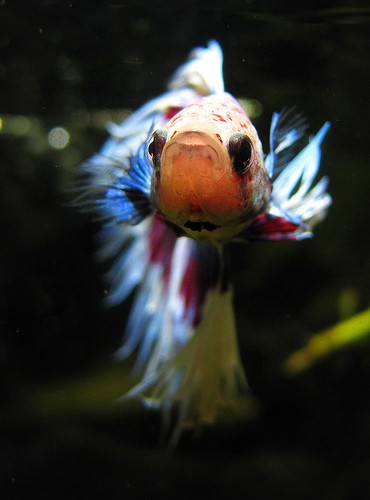Betta fish, also known as Siamese fighting fish, are popular pets due to their vibrant colors and relatively low maintenance. However, responsible betta ownership includes understanding their needs, especially when it comes to feeding. A common concern for betta owners, particularly when planning vacations, is “How Long Can A Betta Fish Survive Without Food?”. It’s a question that balances convenience with the well-being of your aquatic companion.
Fish, being cold-blooded creatures, have metabolisms influenced by their environment. Water temperature plays a significant role in their metabolic rate and thus, their nutritional requirements. Generally, fish in warmer water require more frequent feeding than those in cooler water. Think of Koi carp: during warm summer months, they are fed regularly, but as winter approaches and water temperatures plummet, their metabolism slows dramatically, allowing them to endure extended periods without food. Betta fish, as tropical species, thrive in warm waters and cannot tolerate cold conditions. They depend on consistent feeding and cannot go without sustenance for very long durations, although they can outlast mammals in similar situations. Missing a feeding day or even two is generally not harmful to a healthy adult betta fish.
 Feeding betta fish pellets in a home aquarium, demonstrating proper nutrition for betta fish care and longevity.
Feeding betta fish pellets in a home aquarium, demonstrating proper nutrition for betta fish care and longevity.
Automatic fish feeders might seem like a convenient solution for ensuring your betta is fed while you are away. However, they are known for their unreliability. These devices can malfunction, either dispensing excessive amounts of food or failing to dispense any at all. Numerous accounts online detail instances of automatic feeders malfunctioning with disastrous results. If you consider using an automatic feeder as your only option, it’s strongly advised to test it thoroughly for at least a week prior to your departure. Monitor its performance daily to ensure it’s dispensing the correct amount of food consistently. A critical concern with malfunctioning automatic feeders is the potential for overfeeding. If a feeder dumps its entire food reservoir into the aquarium, the decaying food can rapidly elevate ammonia levels, creating a toxic environment for your betta. Ammonia poisoning is a serious threat to water quality and fish health.
It’s important to distinguish between survival and thriving. Often, betta owners inquire about how long their fish can survive without food. While survival is technically possible for a period, it’s crucial to understand that survival mode is far from ideal. Starvation is a distressing experience for any living creature, including your betta. After approximately 4 to 5 days without food (this is an estimated timeframe), a betta’s body will begin to draw upon its energy reserves to stay alive. Prolonged fasting induces significant stress and can eventually lead to kidney failure and organ damage. Even if a betta appears to have survived a prolonged period without food, their immune system becomes compromised, making them highly vulnerable to common fish diseases, which can lead to serious health complications or even death. In their natural wild habitats, betta fish live in environments rich with insects and larvae, ensuring a readily available food source. It’s highly unlikely that wild bettas would naturally endure extended periods without food.
In summary, for short absences like a weekend, most healthy betta fish will be fine without feeding. However, for trips extending beyond a few days, it’s crucial to arrange for someone to care for your fish, whether it’s a friend, family member, or neighbor. Leaving a betta fish without food or supervision for a week or longer is strongly discouraged and can have severe consequences for their health and well-being. Prioritizing responsible betta care ensures they not only survive but thrive in your home aquarium.

